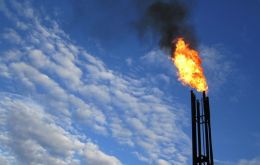MercoPress. South Atlantic News Agency
Energy & Oil
-
Tuesday, February 16th 2016 - 07:37 UTC
Noble Energy cancels drilling in Falklands, following termination of rig contract

Falkland Islands based company, Argos Resources Ltd. said it has received notification from Noble Energy, the operator of license PL001 in which Argos holds a 5% overriding royalty interest, that it is exercising its rights to declare Force Majeure on the well.
-
Friday, February 12th 2016 - 18:47 UTC
Falklands' (oil exploration) “has been a hugely successful campaign”, says Rockhopper

Rockhopper Exploration which has a joint venture agreement with Premier Oil offshore the Falkland Islands, described the oil exploration campaign now terminated as a 'huge success' and underlines the postponement of the Chatham well drilling will have no impact on the Field Development Plan for the Sea Lion oil discovery development.
-
Friday, February 12th 2016 - 18:14 UTC
Falklands' exploratory campaign ended, following termination of ocean rig contract

The Falkland Islands government and Premier Oil have announced on Friday the ocean rig 'Eirik Raude' contract termination, which in practical terms puts an end to the current exploratory campaign and the scheduled drilling of the Chatham well. Nevertheless both sides underlined the success of the now terminated campaign with the oil discoveries at the Zebedee and Isobel Deep prospects in the North Falkland basin and look forward to continue working in the near future.
-
Friday, February 12th 2016 - 06:27 UTC
Petrobras faces legal challenges in the billions from international investors

Brazil’s troubled state oil firm Petrobras faces possible new legal challenges from a coalition of groups representing international investors based in Europe in the US. The financially hobbled and corruption-racked company is being sued over alleged fraud-related losses the investors suffered on its shares and bonds traded outside the Americas.
-
Friday, February 12th 2016 - 06:15 UTC
Falklands' oil industry development continues despite slump in crude prices

Rockhopper Exploration flagship project, offshore the Falkland Islands the Sea Lion oil field development, continues to advance despite the recent slump in crude prices.
-
Saturday, February 6th 2016 - 05:31 UTC
Brazil's inflation at 12-year high in January driven by food and transportation prices

Brazil's inflation rate rose to a 12-year high, officials said on Friday, as Latin America's largest economy continues to struggle through a protracted recession. Driven by rising food prices, the annual inflation rate hit 10.71%, the highest since November 2003 and well beyond the central bank's target ceiling of 6.5%, said national statistics institute IBGE.
-
Friday, February 5th 2016 - 08:04 UTC
Falklands: Contractual dispute with rig company raises speculation over drilling program

The Falkland Islands government would not permit anything less than full and proper abandonment of exploration wells drilled by any operator in the Falkland Islands, stated Director of Mineral Resources Stephen Luxton this week, following news of a contractual dispute between Premier Oil and Ocean Rig over the drilling rig Eirik Raude.
-
Thursday, February 4th 2016 - 08:17 UTC
Magallanes region in south Chile could hold a treasure of unconventional tight gas

The U.S. Geological Survey estimates that the Glauconitica zone of Chile's southernmost Magallanes region holds nearly 8.3 trillion cubic feet of technically recoverable, unconventional tight gas, or nearly double Chile's production of that fossil fuel over the past 70 years.
-
Wednesday, February 3rd 2016 - 05:52 UTC
Norway's Statoil confirms interest in Uruguay's offshore potential, acquires 15% of exploration block

Norway's Statoil giant announced on Tuesday an agreement with French Total to acquire a 15% working interest in an offshore exploration block in Uruguay's continental shelf. The announcement comes only weeks before Total is preparing to drill its first exploratory well in Uruguayan waters.
-
Wednesday, February 3rd 2016 - 05:38 UTC
BP reported its biggest annual lost and announced 7.000 job cuts

BP slumped to its biggest annual loss last year and announced thousands more job cuts on Tuesday, showing that even one of the nimblest oil producers is struggling in the worst market downturn in over a decade.
